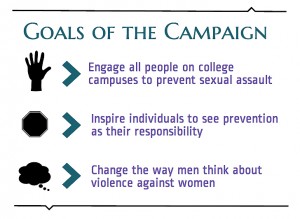
President Barack Obama announced the creation of the “It’s On Us” campaign on Friday, a drive to engage individuals in every professional, social and academic sphere in the prevention of sexual assault on college campuses.
Obama created a pledge system via the ItsOnUs.org website encouraging citizens do their part to prevent sexual assault and report incidents of the crime, as well as urging university enforcement agencies to prosecute violations fully when they occur.
“Students work hard to get into college,” Obama said in a Friday press conference. “When they finally make it onto campus, only to be assaulted, that’s not just a nightmare for them and their families; it’s not just an affront to everything they’ve worked so hard to achieve – it is an affront to our basic humanity.”
An estimated one in five women on college campuses is sexually assaulted during her collegiate experience, and just 12 percent of these assaults are reported, Obama said. He stressed that everyone, regardless of their affiliation with a university, must unite to discourage sexual assault at the college and university level.
“As far as we’ve come, the fact is that from sports leagues to pop culture to politics, our society still does not sufficiently value women,” he said. “We still don’t condemn sexual assault as loudly as we should. We make excuses. We look the other way. The message that sends can have a chilling effect on our young women.”
Bystander intervention and enlisting men to prevent sexual assault are two of the “It’s On Us” campaign’s most important goals, said Anne Johnson, executive director of Generation Progress. The advocacy and prevention organization is one of several partners, including the NCAA, MTV, VH1 and Electronic Arts, working with the White House to enact the “It’s On Us” initiative.
“What’s really exciting about this campaign is that all of those partners have come together because we all believe that we can create a culture where sexual assault is completely unacceptable and that survivors are supported,” she said. “In order to do that, we need to engage young people on college campuses and around the country as part of the solution.”
Johnson said there are already hundreds of student body presidents committed to working to discourage sexual violence. The week of November 17 will serve as a large-scale week of action, where college campuses around the country will organize events to educate and engage students in sexual assault prevention, she said.
“There are survivor organizations that have done incredible jobs advocating for people on college campuses,” Johnson said. “But honestly, they’ve been fighting this fight alone and that has to stop. We need to engage more people and this campaign is a way to do that.”
Maureen Mahoney, director of Boston University’s Sexual Assault Response and Prevention Center said she supports Obama’s campaign initiatives.
“Anything that brings attention to sexual assault, and attempts to engage men, and speaks to the role of the pro-social bystander, is a step in the right direction,” she said in an email.
Several BU students said sexual assault is a widespread issue that needs to be addressed.
“It’s a problem on college campus campuses everywhere, including BU,” said Laura Kakalecz a senior in the College of Arts and Sciences. “This whole issue is because of our culture of victim blaming, efforts of administrators to protect perpetrators rather than victims, and policies that allow perpetrators to remain on campus.”
Kelly Ching, a freshman in the College of Communication commended BU for speaking to freshmen about sexual assault during orientation.
“It’s important to educate people about sexual assault so we can work to prevent it,” she said. “People sometimes trivialize it and see it as something that doesn’t matter.”
Kevin Ngo, a senior in the School of Management, said Obama’s campaign was an important source of support for those personally affected by sexual assault.
“Doing something if you see assault is one thing, but noticing the signals is important too because people may not be aware or process that as sexual assault. It’s something people need to take seriously,” he said. “This is something affects peoples’ lives, especially for individuals whose entire life perspective is changed from an experience like this.”
















































































































